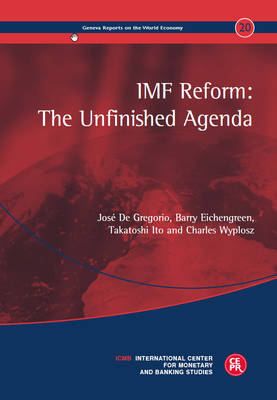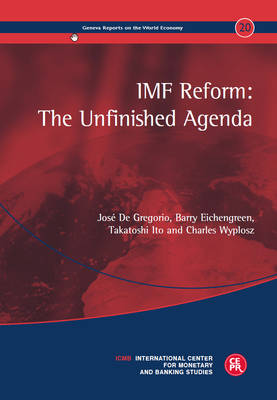
- Retrait gratuit dans votre magasin Club
- 7.000.000 titres dans notre catalogue
- Payer en toute sécurité
- Toujours un magasin près de chez vous
- Retrait gratuit dans votre magasin Club
- 7.000.0000 titres dans notre catalogue
- Payer en toute sécurité
- Toujours un magasin près de chez vous
IMF Reform: The Unfinished Agenda
The Unfinished Agenda
José de Gregorio, Barry Eichengreen, Takatoshi Ito, Charles WyploszDescription
In this sequel to the first Geneva Report on the World Economy, published twenty years ago, the same group of authors review changes in the global economy and the IMF over this two-decade interval. While they find that that the IMF has responded actively to the ongoing globalisation trend, they flag concerns about formidable new challenges. For example, there is a danger that the IMF's resources could be significantly reduced at the very time that effective crisis management requires additional funding. The growth of emerging market economies increasingly calls into question the current distribution of voting power within the institution. Regional monetary arrangements and bilateral currency swaps create an alternative to the multilateral order epitomised by the IMF, as evidenced by the Fund's diminished role in the euro area crisis and by the rise of China with its own network of economic and financial initiatives.
To address these challenges, this report suggests a quick-disbursing emergency financing facility for countries with strong fundamentals that does not require prequalification; puts forward new ideas for the IMF's dealings with regional arrangements; and recommends major changes to IMF governance, including a high-level non-resident Board, elected using a tailored voting procedure, whose role is to make the independent management team more accountable.
Spécifications
Parties prenantes
- Auteur(s) :
- Editeur:
Contenu
- Nombre de pages :
- 125
- Langue:
- Anglais
- Collection :
Caractéristiques
- EAN:
- 9781912179169
- Date de parution :
- 11-09-18
- Format:
- Livre broché
- Format numérique:
- Trade paperback (VS)
- Dimensions :
- 152 mm x 229 mm

Les avis
Nous publions uniquement les avis qui respectent les conditions requises. Consultez nos conditions pour les avis.






